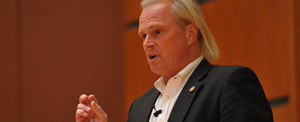Commissioner describes ‘momentus’ changes ahead for futures markets, regulators
Published: November 3, 2010 / Author: Ed Cohen

Bart Chilton, a commissioner with the federal Commodity Futures Trading Commission, called the sweeping financial-industry overhaul enacted earlier this year “the most momentous thing” that has happened to derivatives since derivatives law was invented in the 1930s. A derivative is a financial instrument based on the expected future price of the asset to which it is linked.
Chilton made his remarks during a talk on Nov. 1 at the Mendoza College of Business at the University of Notre Dame. His visit was sponsored by Mendoza’s Center for the Study of Financial Regulation, which was created to encouraged rigorous study of the economics of financial regulation.
Among other provisions, the Dodd-Frank Wall Street Reform and Consumer Protection Act grants the commission authority and a mandate to regulate the sometimes shadowy world of over-the-counter trading in commodities futures. The OTC market is where insurance and financial services company AIG traded exotic mortgage-related derivatives called credit-default swaps and eventually suffered a liquidity crisis. AIG ultimately was bailed out at taxpayer expense.
Since its creation in 1974, the Commodity Futures Trading Commission has regulated only trading carried out on formal exchanges like the Chicago Mercantile Exchange. That trading collectively amounts to $5 trillion a year, said Chilton. But over-the-counter trading has grown to $600 trillion a year, he said.
In a freewheeling and sometimes irreverent talk, Chilton, a commissioner since 2007, explained how futures markets began 150 years ago as a way to reduce farmers’ financial risk while leveling out consumer prices during the year. Without futures trading, he said, prices for commodities like corn would be sky high during planting season, when stores are low, and drop to nearly nothing when the new crop comes in.
Today, in certain commodities markets, Chilton said, investors are so large that they can move the market all by themselves. He compared the situation to a person getting into a hot tub.
“If I get into a hot tub (slowly), the water’s doing to rise a little bit … but if I jump in all at once it’s going to make a big wave. The question is whether [a large trader] is so big that [the trader’s actions are] making an artificial price or if it’s the normal up-and-down fluctuations in the market,” he said.
Part of the commission’s responsibilities include setting position levels that determine what percentage of a market an investor should be allowed to control. Set the limit too high and investors will take their trading to another exchange overseas, he said. But set limits too low and the restrictions may fail to head off another Flash Crash like the one that hit U.S. stock markets on May 6 of this year.
That day saw the Dow Jones Industrials average plunge more than 600 points in five minutes – bringing the average down more than 1,000 points for the day – only to regain most of the 600 points 20 minutes later. Investigations by the Securities and Exchange Commission and the Commodity Futures Trading Commission traced the plunge to a large mutual fund firm selling an unusually large number of stock-market-index futures contracts called E-Mini S&Ps. The sale was robotic or initiated by a computer responding to a preprogrammed algorithm.
Chilton said the sale of so many futures contracts in so short a period of time triggered other robotic trading seconds later as investors tried to arbitrage the suddenly lower futures prices against other S&P-related products in the securities world.
Initial profit-taking triggered other robotic trades that led to a panic and price collapse, he said. At one point, the price of management consulting company Accenture had fallen from $40.13 a share to 1 cent, he said.
Chilton said Dodd-Frank phases in the commission’s new regulatory requirements starting with energy and metals markets in January followed by agricultural commodities in mid-April 2011.
The law does not require the commission to limit positions in financial futures markets – by far the largest futures markets – but the commission has the authority to do so. And Chilton said he thinks it should. He just doesn’t know what those limits should be, he said.
He said some futures-market investors are resisting the impending rule changes and requesting exemptions or delays in the law’s implementation. His answer: “Sorry, Charlie.”
“They just don’t get it, that the law has been changed. They are going to have to change some of their business models. Maybe their compliance officers are going to have to do things a little bit differently,” he said. “But guess what, it hasn’t worked out so hot in the last decade. I mean, we had an economy that went on a highway to hell because of how the deregulatory approach since 1999 took us on this flight path that wasn’t so good.”
Besides limiting investors’ shares of a market, he said the commission may also need to establish trading speed limits. Chilton asked the audience of business students and faculty to imagine what would happen if an investor controlled a tolerable 10 percent of the market but traded that share 10 times in 110 seconds using a computer-driven algorithm.
Returning to his hot tub analogy, he said it would be like a person getting in and out of the tub that frequently.
“That hot tub’s is going to be very volatile and so are the markets.”
The commissioner also mentioned that new regulatory authority is bringing new employment opportunities. Over the next couple of years, he said, the commission plans to hire 500 people, both interns and full-time employees. Anyone with an interest in financial markets should apply, he said.
“This is an exciting time, a momentous time like all get out.”
/news_and_events/news_articles/article/7884/commissioner-describes-momentus-changes-ahead-for-futures-markets-regulators




